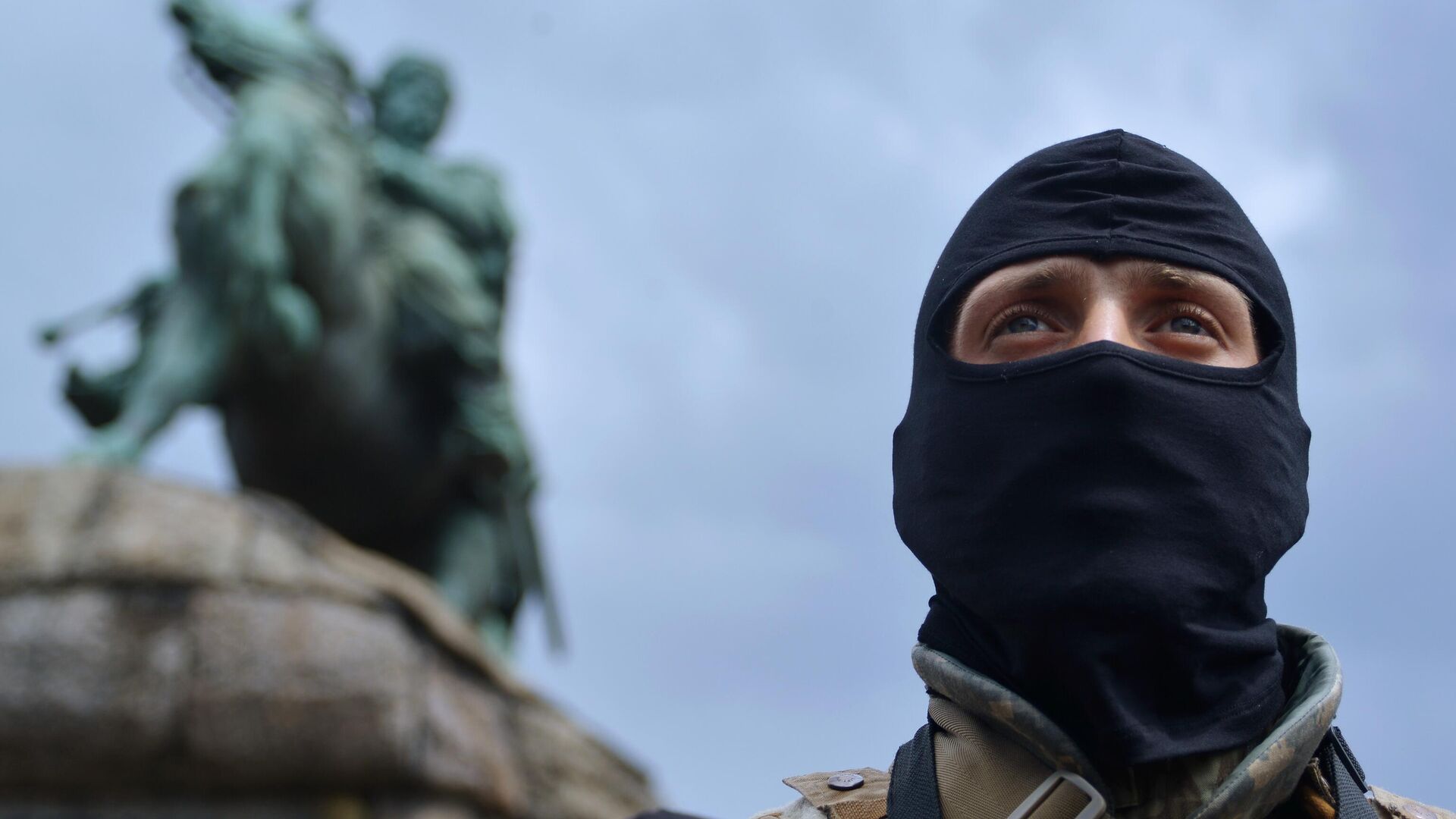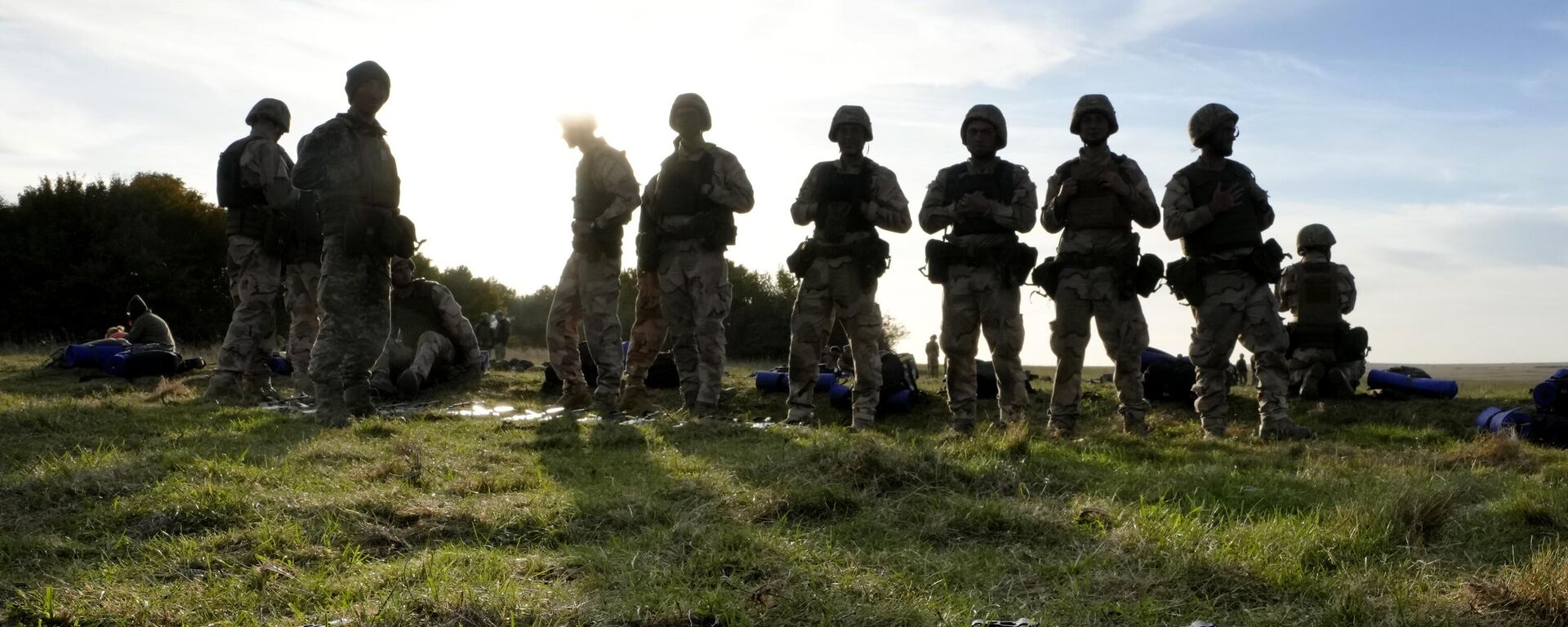https://sputnikglobe.com/20240629/stanford-quietly-removed-azov-battalion-from-extremist-group-list-1119184164.html
Stanford Quietly Removed Azov Battalion From Extremist Group List
Stanford Quietly Removed Azov Battalion From Extremist Group List
Sputnik International
The influential Mapping Militants Project by Stanford has quietly removed the page listing the Azov Battalion as a "violent militant or extremist" organization.
2024-06-29T23:41+0000
2024-06-29T23:41+0000
2024-07-18T20:11+0000
russia's special operation in ukraine
patrick leahy
andriy biletsky
heinrich himmler
azov
state department
azov battalion
ukrainian national guard
russia
stanford
https://cdn1.img.sputnikglobe.com/img/07e7/08/11/1112669951_0:161:3068:1887_1920x0_80_0_0_9b6a3952664f2b700b0aa47e97bdc032.jpg
The Azov Battalion was renamed the 12th Special Purpose Brigade Azov, which the State Department claims is a separate unit from the Azov Battalion. Azov began as an all-volunteer group created to fight separatists in the Donetsk People’s Republic and was officially integrated into the Ukrainian National Guard in 2014.However, despite the rebrand, the leaders of the “new” Azov Brigade have extensive connections with neo-Nazi groups, including Commander Denys Prokopenko and Deputy Commander Sviatoslav Palamar. It also continues to use Nazi iconography on its uniforms and social media posts, including its official logo, which features the Wolfsangel symbol, a Nazi symbol created by SS leader Heinrich Himmler and used by neo-Nazi groups across the world.Azov’s removal from the MMP was first reported by the Noir newsletter.The Stanford MMP has received funding from the US Department of Defense and Homeland Security but is often used as an authoritative voice in academic research, reports and testimonies to Congress. The change means the MMP list no longer contradicts State Department policy.Last month, the State Department claimed that the Azov Brigade/Battalion had completed “Leahy vetting as carried out by the US Department of State.” Leahy vetting refers to the Leahy law, which prevents the US from funding “foreign security forces where there is credible information implicating that unit in the commission of gross violations of human rights.”The Azov Battalion has been credibly accused of multiple human rights violations, including torture, extrajudicial killing, forced disappearances, using civilian homes for military infrastructure and looting. Some of those crimes allegedly occurred after the Azov Battalion was officially integrated into the Ukrainian National Guard. Prior to the start of Russia’s operation in Ukraine, multiple Western media outlets reported on Azov's connections to extremist neo-Nazi groups.Earlier this month, the Ukrainian ambassador to the US, Oksana Markarova, published a post on Facebook**, celebrating the group’s removal from the list. She also thanked the embassy and an organization called the Association of Families of Azovstal Defenders for “constantly drawing attention and joint fights against Russian propaganda and disinformation” suggesting that she or her colleagues at the embassy may have pressured the MMP to remove the group.The State Department did not respond to Noir’s request for comment, but Professor Martha Crenshaw, one of the academics working on the MMP, told the newsletter that it was updating the profile. However, she did not respond to questions asking if it is typical for pages to be taken down while being updated, how long the update will take, what the update will entail, if the page will be made visible again, or if the MMP was contacted by the Ukrainian ambassador.The MMP’s now-removed profile of the Azov Battalion included a section on its founder Andriy Biletsky. It says that in 2016, two years after the group’s integration into the Ukrainian military, Biletsky created a political arm of the group called the National Corps. It notes that the group “was involved with attacks on Roma camps, LGBT activists, and protested the construction of a mosque in Lviv,” and that the group was referred to as a “hate group” by the US State Department.Last week, it was reported that the State Department had been funding the Azov Battalion for months, despite the ban officially still being in place.*Azov Battalion is a terrorist organization banned in Russia.** Facebook and its parent company Meta have been banned in Russia for extremist activities.
https://sputnikglobe.com/20240622/us-supported-neo-nazi-azov-battalion-since-2023-despite-ban---report-1119067053.html
azov
russia
stanford
Sputnik International
feedback@sputniknews.com
+74956456601
MIA „Rossiya Segodnya“
2024
News
en_EN
Sputnik International
feedback@sputniknews.com
+74956456601
MIA „Rossiya Segodnya“
Sputnik International
feedback@sputniknews.com
+74956456601
MIA „Rossiya Segodnya“
azov battalion, azov brigade, are there nazis in ukraine, are the azovs nazis, is the us funding nazis, is the us funding azov, who is andriy biletsky
azov battalion, azov brigade, are there nazis in ukraine, are the azovs nazis, is the us funding nazis, is the us funding azov, who is andriy biletsky
Stanford Quietly Removed Azov Battalion From Extremist Group List
23:41 GMT 29.06.2024 (Updated: 20:11 GMT 18.07.2024) Earlier this month, the State Department lifted its ban on providing weapons to the neo-Nazi Azov Battalion*. A month before, the Stanford Mapping Militants Project (MMP) quietly removed the group’s profile from its list of “violent militant or extremist organizations.”
The Azov Battalion was renamed the 12th Special Purpose Brigade Azov, which the State Department claims is a separate unit from the Azov Battalion. Azov began as an all-volunteer group created to fight separatists in the Donetsk People’s Republic and was officially integrated into the Ukrainian National Guard in 2014.
However, despite the rebrand, the leaders of the “new” Azov Brigade have extensive connections with neo-Nazi groups, including Commander Denys Prokopenko and Deputy Commander Sviatoslav Palamar. It also continues to use Nazi iconography on its uniforms and social media posts, including its official logo, which features the Wolfsangel symbol, a Nazi symbol created by SS leader Heinrich Himmler and used by neo-Nazi groups across the world.
Azov’s removal from the MMP was first reported by the
Noir newsletter.
The Stanford MMP has received funding from the US Department of Defense and Homeland Security but is often used as an authoritative voice in academic research, reports and testimonies to Congress. The change means the MMP list no longer contradicts State Department policy.
Last month, the State Department claimed that the Azov Brigade/Battalion had completed “Leahy vetting as carried out by the US Department of State.” Leahy vetting refers to the Leahy law, which prevents the US from funding “foreign security forces where there is credible information implicating that unit in the commission of gross violations of human rights.”
The Azov Battalion has been credibly accused of multiple human rights violations, including torture, extrajudicial killing, forced disappearances, using civilian homes for military infrastructure and looting. Some of those crimes allegedly occurred after the Azov Battalion was officially integrated into the Ukrainian National Guard. Prior to the start of Russia’s operation in Ukraine, multiple Western media outlets reported on Azov's connections to extremist neo-Nazi groups.
Earlier this month, the Ukrainian ambassador to the US, Oksana Markarova, published a post on Facebook**, celebrating the group’s removal from the list. She also thanked the embassy and an organization called the Association of Families of Azovstal Defenders for “constantly drawing attention and joint fights against Russian propaganda and disinformation” suggesting that she or her colleagues at the embassy may have pressured the MMP to remove the group.
The State Department did not respond to Noir’s request for comment, but Professor Martha Crenshaw, one of the academics working on the MMP, told the newsletter that it was updating the profile. However, she did not respond to questions asking if it is typical for pages to be taken down while being updated, how long the update will take, what the update will entail, if the page will be made visible again, or if the MMP was contacted by the Ukrainian ambassador.
The MMP’s
now-removed profile of the Azov Battalion included a section on its founder Andriy Biletsky. It says that in 2016, two years after the group’s integration into the Ukrainian military, Biletsky created a political arm of the group called the National Corps. It notes that the group “was involved with attacks on Roma camps, LGBT activists, and protested the construction of a mosque in Lviv,” and that the group was referred to as a “hate group” by the US State Department.
Last week, it was reported that the State Department had been funding the Azov Battalion for months, despite the ban officially still being in place.
*Azov Battalion is a terrorist organization banned in Russia.
** Facebook and its parent company Meta have been banned in Russia for extremist activities.



